"Mr. No" of the Red Empire
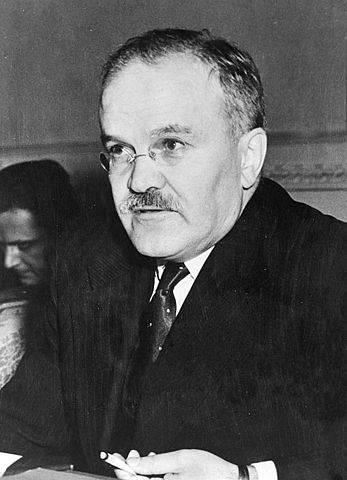 30 years ago, 8 November 1986 of the year, Vyacheslav Mikhailovich Molotov passed away. Vyacheslav Molotov was one of the main figures in Soviet politics since the 1920-s, when he rose with the support of Stalin. In fact, Molotov became the second person in the Soviet state and was very popular among the people.
30 years ago, 8 November 1986 of the year, Vyacheslav Mikhailovich Molotov passed away. Vyacheslav Molotov was one of the main figures in Soviet politics since the 1920-s, when he rose with the support of Stalin. In fact, Molotov became the second person in the Soviet state and was very popular among the people. From 1930 to 1941, Molotov served as Chairman of the Council of People’s Commissars (head of government), from 1939 to 1949 and from 1953 to 1956 - Minister of Foreign Affairs. In 1957, he was one of the main leaders of the "anti-party group" and tried to remove N. Khrushchev from power. The opposition to Khrushchev was defeated, and Molotov was expelled from the Presidium of the Central Committee. In 1961, he retired and was “artificially forgotten.”
In place of the chief diplomat of the USSR, Molotov proved himself a real defender of the interests of the great Russia. Molotov signed a non-aggression pact with Nazi Germany (Molotov-Ribbentrop Pact, 1939), which thwarted the plans of England and France to start a war between Germany and the USSR already in 1939, which allowed Russia to push back the strategic borders in the west, returning Western Russian lands and win time to prepare for a big war. The Neutrality Pact between the USSR and Japan (1941), which allowed Moscow to partially remove the threat of war in the East, played a huge role. After the end of the war, Molotov participated in negotiations with Western allies, displaying a rare intransigence, putting Western politicians in place.
After the departure of I. Stalin, Molotov opposed Khrushchev’s pre-Stalinization policy. Molotov defended Stalin’s policies and cause until his death, sharply speaking of the new Soviet leaders, especially Khrushchev. To the end, he remained Stalin's "iron commissar", one of those "titans" who turned Russia from a backward agrarian power into an industrial giant, a superpower that controlled a large part of the planet.
The beginning of the life path
Vyacheslav Mikhailovich Molotov (real name Scriabin) was born in the village of Kukarka, Vyatka province. Father - Mikhail Prokhorovich Scriabin, from the townspeople of the city of Nolinsk, was a clerk in Kukarka. Mother - Anna Yakovlevna Nebogatikova from a merchant family. His father was a wealthy man and gave his sons a good education. Contrary to popular belief, his family was not related to the composer Alexander Scriabin. Vyacheslav was a quiet and shy teenager. He played the violin and wrote poetry. From 1902 year, together with older brothers to 1908, he studied at the Kazan first real school.
In the years of Vyacheslav's study, the first Russian revolution occurred. During these years, most of the educated youth were very radical. Vyacheslav joined one of the circles of self-education in the study of Marxist literature. There he became friends with the son of a wealthy merchant, Viktor Tykhomirnov, who joined the Bolshevik group in Kazan in 1905. Under the influence of Tihomirnova, Vyacheslav joined the Bolshevik Party in 1906.
In 1909, Vyacheslav was arrested and spent two years in exile in Vologda. After serving it, he came to St. Petersburg in 1911 and entered the Polytechnic Institute there (he completed his fourth year at the Faculty of Economics). Molotov's old friend Tikhomirnov was one of the organizers of the Pravda newspaper and donated a large sum for the needs of the publication. To work in Pravda, Tihomirnov attracted Molotov, who began to publish his articles here. The first meetings of Molotov with Stalin took place precisely in the affairs of Pravda, but this first acquaintance of them was brief.
From that time on, Molotov led the life of a “professional revolutionary”, wrote for the party press, and participated in the creation of an underground organization. Before the outbreak of the First World War, he moved from St. Petersburg to Moscow. In 1915, Molotov was arrested in Moscow for revolutionary activities and exiled to distant Irkutsk for three years. In 1916, he escaped from this link and returned to the capital. In the same year, he became a member of the Russian Bureau of the Central Committee of the RSDLP and entered into its top three. Throughout the war, Molotov lived with other people's documents.
He took the pseudonym "Molotov", which symbolized his close relationship with "industrial" occupations and districts. Molotov's grandson, historian V. A. Nikonov, noted that the taking of such a pseudonym was due to the fact that: “... Molotov - it sounded quite proletarian, industrial, which should have appealed to workers who did not like the party members from the intelligentsia. The second reason is quite prosaic. It was easier for grandfather to pronounce it. In Scriabin's word, the first three consonants made him stutter, especially when he was worried. ” Molotov tried to speak less, as he stuttered.
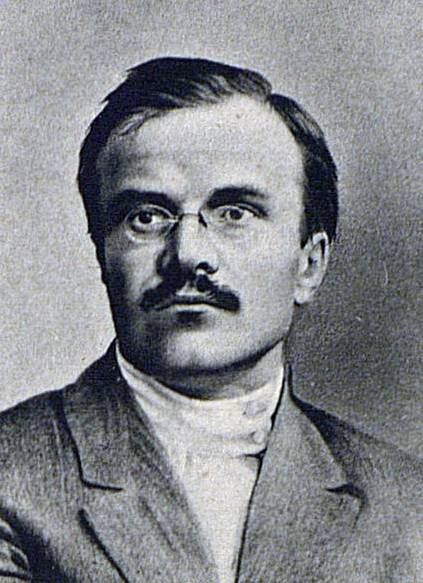
Revolution. Ally Stalin
When the February Revolution took place at 1917, Pravda newspaper, where Vyacheslav Mikhailovich began working again, first took the far left position and began to advocate for the overthrow of the Provisional Government. By the beginning of March, influential Bolsheviks, including Kamenev and Stalin, had returned to the capital from exile in Siberia. Kamenev began to translate Pravda into more moderate positions. However, a few weeks later Lenin arrived in Russia. He proclaimed his “April Theses” and returned “The Truth” to a radical position. During these months, Molotov entered the Executive Committee of the Petrograd Soviet and became close friends with Stalin. This friendship and predetermined his future fate. Molotov supported the idea of an armed uprising and in October 1917 was a member of the Petrograd Military Revolutionary Committee.
After October, Molotov temporarily retired to the second roles in the party. He did not have any oratorical talent, no revolutionary energy, no big ambitions, but he was distinguished by executive performance, perseverance and tremendous efficiency. In addition, he had such important qualities for a Russian communist as honesty, intelligence, lack of visible vices. In 1918, Vyacheslav Mikhailovich was appointed head of the Council of National Economy of the Northern Region. In 1919, he worked in senior positions in the Volga region, and then in Ukraine.
In March, 1919 died J. Sverdlov, one of the most sinister figures among revolutionaries. Perhaps from the beatings inflicted on him by a crowd of people during one provincial trip. Sverdlov virtually single-handedly led the arrangement of party cadres. Now these responsibilities were assigned to the collegial Secretariat of the Central Committee. Trotsky's supporters, N. Krestinsky, E. Preobrazhensky and L. Serebryakov, became the three secretaries. However, after a collision with Trotsky during the “discussion about trade unions”, Lenin at the 10th Congress of the RCP (B) (1921 year) achieved an update of the Secretariat. The "Responsible" (first) secretary was appointed not associated with Trotsky, the inconspicuous Molotov. Thanks to the new position he became a candidate member of the Politburo.
In the same 1921, he married the revolutionary Polina Pearl. According to their grandson V. Nikonov: “They loved, even adored each other, although they were different people ...”. The Molotovs had the only daughter Svetlana (in the future, a researcher at the Institute of stories).
Molotov, therefore, occupied almost the same post, from which a year later began the rapid rise of Stalin. Molotov’s work as head of the Secretariat was soon criticized by Lenin and Trotsky. Lenin scolded him for "shameful red tape." Among the Bolsheviks, Molotov stood out because he always wore a “bourgeois” suit and tie, and not a gymnast or a French jacket. Trotsky called it "embodied mediocrity." In April, 1922 of the year, on this post, called the “general secretary”, at the suggestion of G. Zinoviev and L. Kamenev, I. Stalin was appointed. Molotov took the place of the second secretary.
After the death of Lenin, Vyacheslav Molotov began to actively support Stalin in the fight against the "fifth column", figures who wanted to burn Russia in the firebox of the "world revolution" or even were agents of Western influence - Lev Trotsky, Grigory Zinoviev, Lev Kamenev, and "right-wing deviationists." Molotov became the leading figure in the "Stalinist" center of the party, which also included Kliment Voroshilov and Sergo Ordzhonikidze. Thus, Trotsky and his supporters underestimated not only Stalin, but also Molotov, who turned out to be a talented "bureaucrat" and outplayed the enemy in a "battle" for party cadres.
In 1924-1927 Molotov's candidate member, in 1929-1931. - Member of the Presidium of the CEC of the USSR. From 1927, he was a member of the Presidium of the All-Russian Central Executive Committee. From 1928 to 1929, he worked as First Secretary of the Moscow City Party Committee. Molotov carried out a decisive purge of the Moscow party organization from the "Right-wing Supporters", replacing them with Stalin's supporters.
As historian R. Medvedev noted: “For one hundred and thirty days of being the first secretary of the CIM, Molotov really“ rallied ”the Communists of the capital around the“ leader ”, shaking up almost the entire leadership of the Moscow Party organization. Of the six heads of departments of the CIM, four were released; of the six secretaries of the district committees of the capital, only two continued to carry out party duties. Compared to previous elections, the composition of the CIM Bureau has been updated by almost 60 percent. Of the 157 elected members of the Moscow Committee, 58 was its former member. Bukharin and Ryutin dropped out of the members of the CIM, and they elected Kaganovich and other obvious Stalinists. Molotov brilliantly carried out Stalin's instructions, cutting the "tight knot" in the capital party organization (R. Medvedev. "Stalin's entourage").
Head of the government
19 December 1930 of the Year Molotov was appointed Chairman of the Council of People's Commissars of the USSR (Soviet Government) and the Council of Labor and Defense instead of the oppositionist Alexei Rykov. At the beginning of the 1930 of the USSR Council of People's Commissars, a standing Defense Commission was established (from the 1937 of the year - the Committee of Defense), which was headed by Molotov to the 1940 of the year. In 1937-1939 He served as Chairman of the Economic Council (EcoSo) SNK USSR. Thus, Vyacheslav Molotov became the second person on the Soviet Olympus at that time and was one of the main creators of the Soviet national economy and defense potential, which allowed Russia to make a qualitative leap in development and eventually win the world war and become a superpower.
Stalin, Molotov and Voroshilov
Министр иностранных дел
After the Munich Agreement 1938 of the year and the subsequent invasion of Hitler into Czechoslovakia, it became obvious that M. Litvinov’s course on “collective security” in Europe (unification of the USSR and Western democracies to contain aggressive plans of Nazi Germany) and active cooperation with Western “partners” failed .
At the end of April 1939, a government meeting took place in the Kremlin. Molotov openly accused Litvinov of “political foolishness”. 3 May, after a report to Stalin about the latest events related to the Anglo-French-Soviet negotiations, Litvinov was removed from office. Molotov accused the former People's Commissar: "Litvinov did not ensure the holding of a party line in the People's Commissariat on the selection and training of cadres, the NKID was not completely Bolshevik, since Comrade Litvinov was holding onto a number of alien and hostile people and the Soviet state." Litvinov replaced Vyacheslav Molotov, chairman of the Council of People's Commissars of the USSR. In May, 1941 gave the post of head of government to Stalin, and Molotov himself was appointed his deputy.
Entering the new position, Molotov made personnel changes in the Commissariat. 23 July 1939, the NCID meeting adopted a resolution that specifically stated: “During this short period of time, a lot of work has been done to clean the NCID from unfit, questionable and hostile elements.” Molotov put forward Andrei Gromyko and a number of other young specialists for responsible diplomatic work, who later became widely known in the field of foreign policy, defending the interests of the USSR on the world stage.
Moscow is moving from unsuccessful attempts aimed at ensuring collective security in Europe to attempts at resolving the country's security issue on its own. Having finally made sure that England and France would not go to a real anti-Hitler alliance, supported by a military pact, but on the contrary, they would push Hitler with all their forces to go to the East, Stalin and Molotov agreed to an agreement with Berlin. To gain time and improve the starting strategic conditions on the western borders, in the conditions of the beginning of a big war in Europe. 18 August 1939 signed a trade agreement between the USSR and Germany. 22 August Ribbentrop flew to Moscow to conclude a non-aggression pact. It is known as the Molotov-Ribbentrop Pact.
Thus, Moscow solved a number of important tasks: it returned the Western Russian lands, which, after the collapse of the Russian Empire, were seized by Poland; pushed the western borders to the west, improving the position of the Red Army in the face of a major war; won time to prepare for war. It was also hoped that prudence in Berlin would take up and this time the Germans and Russians will not be vented.
During this period, Great Russia (USSR) solved the security problem at the strategic north-western boundary, in the Leningrad region. After attempts to peacefully negotiate with Finland (Moscow offered serious concessions), the Soviet-Finnish war began, which ended in victory for the USSR. Russia returned the Karelian Isthmus and Western Karelia, islands in the eastern part of the Gulf of Finland. Moscow has received for rent Gangut (Hanko). This strengthened the defense of Leningrad. The USSR also returned the Baltic states and Bessarabia (Moldavia) to the empire. As a result, Moscow significantly improved its position in the western strategic direction on the eve of the Great War.
14 April 1941 Stalin and Molotov signed a non-aggression pact with Japan. Japanese Foreign Minister Matsuoka arrived in Moscow for this. The treaty was extremely important for the USSR in the face of growing distrust with Germany. Thus, the Soviet government partially solved the problem of threat from the East. Tokyo abandoned the idea of an immediate strike on the USSR (together with Germany) and turned south, deciding to go to war with the United States and England. As a result, the global position of the USSR under world war conditions strengthened considerably.
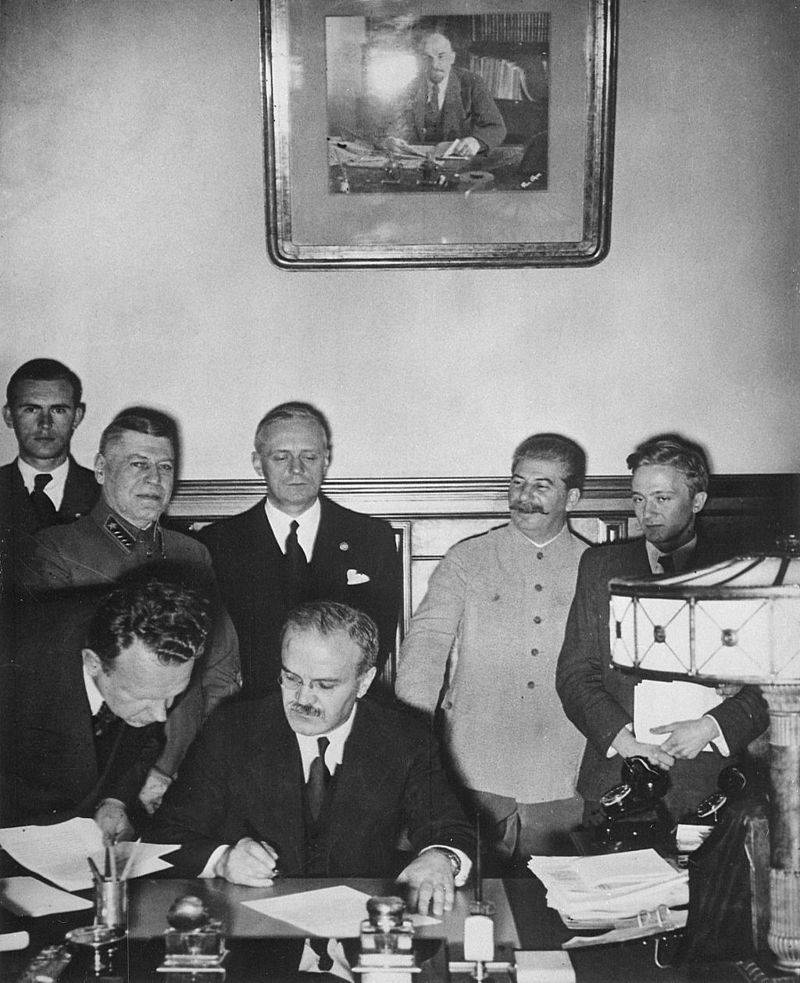
Molotov signs the Treaty of Friendship and the border between the USSR and Germany, followed by Ribbentrop
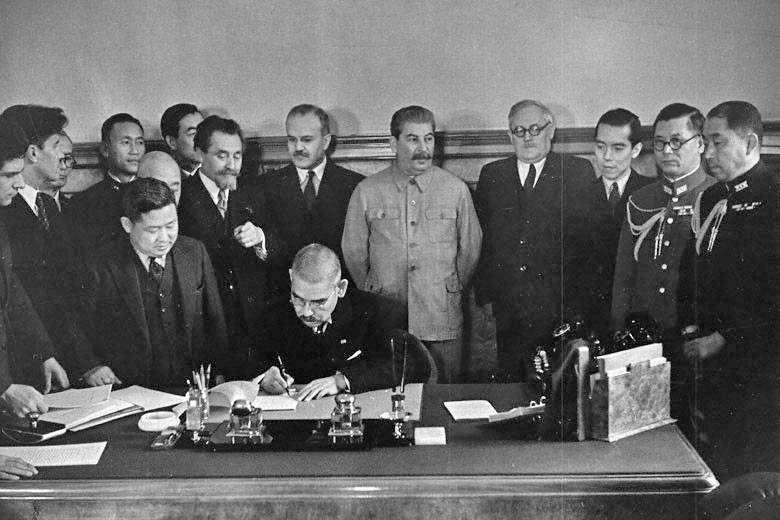
The signing of the Soviet-Japanese neutrality pact
Great Patriotic War
On the first day of the Great Patriotic War, Molotov spoke on the radio about the beginning of the war, ending this speech with the famous words: “Our cause is just. The enemy will be defeated. Victory will be ours".
12 July Molotov and Ambassador Kripps signed an agreement between the governments of the USSR and the UK on joint actions in the war against Germany. The result of this agreement was that cooperation was established with the countries of the anti-Hitler coalition, and diplomatic relations were restored with the governments of European countries occupied by Nazi Germany, who were emigrating to London. 30 June 1941, with the formation of the State Defense Committee (GKO), Molotov was approved as deputy chairman of Stalin.
September 29 to October 1 1941 held a conference in Moscow, in which the USSR, the USA and the United Kingdom took part; The conference agreed on military supplies to the Soviet Union. When in October 1941, the USSR Commissar for Foreign Affairs, together with the diplomatic corps, was evacuated to Kuibyshev, Molotov, like Stalin, remained in Moscow.
At the end of May - the beginning of June, Molotov visited the Allies with a diplomatic mission: England and the United States. 1942 May Molotov, together with Anthony Eden, signed the Anglo-Soviet Union Treaty in London - an agreement on the military and political union of the USSR and Great Britain. According to it, the USSR and Great Britain agreed to render each other military and other assistance, not to conclude a separate peace with Germany, and also not to conclude any alliances and not to participate in any coalitions directed against the other side. Next, Molotov visited the United States. He met with President Franklin Roosevelt, and ratified the Lend-Lease Agreement between the USSR and the USA. Both the British and the US government promised (although not specifying details) to open a second front against Germany. “So I made friends with the bourgeoisie,” Molotov joked after these visits.
Vyacheslav Molotov took part in the Tehran, Yalta, Potsdam conferences, which created the foundations of the post-war world order. He represented the Soviet Union at a conference in San Francisco (April – June 1945), where the United Nations was created. Even during the period of the military alliance between Moscow and Western democracies, Molotov was known as a tough negotiator and adamant defender of Soviet interests.
In addition, during the war, Molotov also resolved military production issues. He signed a decree of the CPC on the production of incendiary bottles (it received the unofficial name "Molotov cocktail"); worked with the field of tank building; Initially, it was Molotov, in 1942, who was entrusted with the leadership of the Soviet “atomic project” - the work to create an atomic weapons. Molotov also oversaw questions of science, including the work of Moscow State University. On his initiative, the Moscow State Institute of International Relations was established on the basis of the Faculty of International Relations of Moscow State University in order to train personnel for diplomatic institutions of the USSR 14 in October 1944.
The work of Vyacheslav Mikhailovich was of great importance for the country, therefore, on March 8, 1940, in connection with the 50th anniversary of V.M. Three Molotovsk, two Molotovabad, Cape Molotov and Molotov Peak appeared on the map of the USSR. To this must be added collective farms, enterprises and institutes named after Molotov. Decree No. 79 of the Presidium of the Supreme Soviet of the USSR of September 30, 1943 for special services to the Soviet state in development tank industry during the Great Patriotic War, V. M. Molotov was awarded the title Hero of Socialist Labor with the award of the Order of Lenin and the medal "Hammer and Sickle".
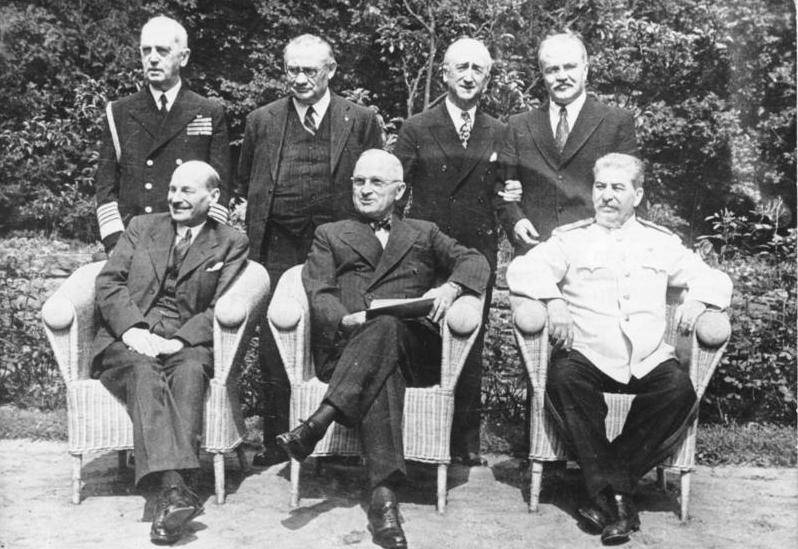
The Potsdam Conference
The post-war period
In 1945-1947 Molotov took part in all four conferences of foreign ministers of the victor states of the Second World War. He was distinguished by an extremely tough attitude towards the Western powers. Vyacheslav Molotov often traveled to the United States to participate in the work of the United Nations, and because of his intransigent position, as well as the frequent use of the “veto” right, he received the nickname “Mr. No” in diplomatic circles.
On behalf of the Soviet government, Molotov condemned the Marshall Plan as “imperialistic” and declared that he divided Europe into two camps - capitalist and communist. The USSR and other countries of the Eastern bloc came up with the so-called "Molotov Plan." This plan created a series of bilateral relations between Eastern European states and Moscow. Subsequently, the Council for Mutual Economic Assistance (CMEA) developed. Interestingly, Molotov and Stalin actively supported the idea of creating the state of Israel, while all other countries were against it, including the United States and Great Britain. Thus, they wanted to create a Jewish state, the protection of which would focus the interests of the Jews.
19 March 1946, when the SNK was reorganized into the Council of Ministers, Molotov was removed from his post as first deputy, becoming merely deputy chairman of the USSR Council of Ministers, but remained Stalin’s first deputy. In this post he oversaw education, science and law enforcement. In 1947, Molotov was delegated the authority of Stalin on the atomic project. In addition, Molotov headed the Soviet foreign intelligence service as chairman of the Information Committee at the Council of Ministers of the USSR. In 1949, he was a member of the Permanent Commission to conduct open trials of the most important cases of former Wehrmacht soldiers and German punitive bodies, convicted of atrocities against Soviet citizens in the temporarily occupied territory of the Soviet Union. He participated in organizing trials of German and Japanese war criminals.
Apparently, because of the political intrigues, Molotov ousted the Soviet Olympus. 4 March 1949 was removed from his post as Minister of Foreign Affairs (Andrei Vyshinsky became Minister of Foreign Affairs). His wife was arrested. However, Molotov retained the post of deputy head of government and member of the Politburo. At the XIX Party Congress (1952), Molotov was elected to the Presidium of the Central Committee (replaced the Politburo).
The restructuring of the Moscow leadership after Stalin’s death strengthened Molotov’s position. Georgy Malenkov, Stalin's successor as head of government, March 5, 1953 re-appointed Molotov Minister of Foreign Affairs. Some Soviet leaders believed that it was Molotov who was to become Stalin's successor, but he himself never sought to become the leader of the Union.
Then Molotov made a mistake by supporting Khrushchev in the struggle in the decision to arrest Beria and remove Malenkov from his post as Chairman of the Council of Ministers of the USSR. After this, the positions of Molotov and Khrushchev diverged. In particular, Molotov objected to the policy of de-Stalinization; against the complete withdrawal of Soviet troops from Austria; skeptical about the normalization of relations with Yugoslavia, considering it necessary to criticize the anti-Soviet speeches of the Yugoslav leadership; disagreements also concerned the expediency of excessive and accelerated development of virgin lands; the inclusion of the Crimea in the USSR.
As a result of 1 in May 1956, Molotov was dismissed as Minister of Foreign Affairs under the pretext of a wrong Yugoslav policy. He was appointed Minister of State Control of the USSR. In 1957, Molotov led the so-called "anti-party group" against Khrushchev. Teaming up with Kaganovich and Malenkov, Molotov attempted to displace Khrushchev. At a meeting of the Presidium of the Central Committee, Molotov's group criticized the work of Khrushchev as First Secretary of the Central Committee. The main claims were in the facts of Khrushchev’s violation of the rules of “collective leadership”, as well as in disputes over the revealed economic and foreign policy problems. Their position was supported by the overwhelming majority of members of the highest party body. Khrushchev was supposed to be appointed Minister of Agriculture, and the post of First Secretary would be handed over to Molotov or abolished altogether. But supporters of Khrushchev managed to quickly assemble a Central Committee Plenum, in which the "anti-Party group" was defeated. In addition, Khrushchev was supported by the military led by G. K. Zhukov.
At this career Molotov came to an end. 29 June 1957, Molotov was removed from all posts "for belonging to an anti-party group", removed from the Presidium of the Central Committee of the CPSU and from the Central Committee of the CPSU. The cities named for him were renamed in 1957. Molotov was "banished" by the ambassador to Mongolia. From 1960 to 1961, he led the Soviet mission at the headquarters of the UN Atomic Energy Agency (IAEA) in Vienna.
Retired
At the XXII Congress of the CPSU held in October 1961, Khrushchev and his allies for the first time declared the direct personal responsibility of Molotov, Kaganovich and Malenkov for the iniquities committed under Stalin, and demanded their exclusion from the party. In November 1961, Molotov was recalled from Vienna, removed from his post and expelled from the party. 12 September 1963, Molotov was sent into retirement. He lived in a small wooden cottage in Zhukovka.
Despite the disgrace, Molotov continued his active lifestyle, constantly working at home or in the library. He did not write memoirs, but he expounded his views on various events in public life in notes sent to the CPSU Central Committee. For several years, sought to restore party membership. Under Brezhnev, the gradual rehabilitation of Molotov began. On the basis of communication with Molotov 1970-1980-ies, journalist Felix Chuev published the book "One hundred and forty conversations with Molotov" and "Poluderzhavny ruler." In the year 1984 was restored to the party. General Secretary K. U. Chernenko personally presented him with a party card. As a result, he became the oldest member of the party (since 1906 of the year).
In June 1986, Molotov was hospitalized at Kuntsevo Hospital in Moscow, where he died on November 8. During his long life, V.M. Molotov suffered 7 myocardial infarction, but he lived up to 96 years. Vyacheslav Molotov was buried in Moscow at the Novodevichy cemetery.
Molotov remained faithful to his friendship with Stalin until the end of his days. Molotov condemned Khrushchev as a "Right deviationist." After the Sino-Soviet split, Molotov endorsed the criticism of Mao Zedong about the "revisionist" policy of Khrushchev. According to historian R. Medvedev, Stalin’s daughter Svetlana recalled how Molotov’s wife told her: “Your father was a genius. Now there is no revolutionary spirit anywhere, only opportunism everywhere ... Our only hope is China. Only he kept the revolutionary spirit. "
Like Stalin, Molotov was convinced that the confrontation between the USSR and the West (the cold war) could not have been prevented in any case, since this is the inevitable consequence of the general conflict between communism and capitalism.
Application. Winston Churchill in his memoirs gives this characteristic of the personality of Vyacheslav Mikhailovich Molotov:
“… Vyacheslav Molotov was a man of outstanding abilities and cold-blooded ruthlessness… He lived and prospered in a society where ever-changing intrigues were accompanied by the threat of personal liquidation. His cannonball-like head, black mustache and intelligent eyes, his stony face, dexterity of speech and imperturbable demeanor were a fitting expression of his qualities and dexterity. More than anyone else, he was fit to be the representative and instrument of a policy that cannot be accounted for by the machine. I met him on an equal footing only in negotiations, where there were occasional glimpses of humor, or at banquets, where he benevolently offered a long series of traditional and meaningless toasts. I have never met a person who more perfectly represents the modern concept Robot. And for all that, he was, apparently, an intelligent and sharply honed diplomat ... one after another delicate, testing, embarrassing conversations were carried out with perfect restraint, impenetrability and polite official correctness. No gap was ever found. There was never any unnecessary half-heartedness. His smile of a Siberian winter, his carefully measured and often sensible words… made him the perfect instrument of Soviet politics in a death-breathing world.
... In Molotov, the Soviet machine undoubtedly found a capable and in many respects typical representative for it - always a faithful member of the party and a follower of the communist doctrine ... Mazarin, Talleyrand, Metternich would accept him to his company, if there was another world, which the Bolsheviks allowed themselves to enter ... ".
From the memoirs of Mikhail Smirtyukov, Assistant Deputy Chairman of the Council of People's Commissars of the USSR:
"The derogatory characteristics:" iron ass "," the main party clerk, "" the uncomplaining executor of Stalin's instructions, "were thought up by people who had never worked with Molotov, and more often than not had never seen him. I worked with him for many years and I know that Molotov was not always an obedient executor of instructions. It varied depending on the circumstances. Nor was he a primitive clerk, as he is now often painted ...
The strongest side of the Molotov-politician was the ability to accurately assess their capabilities. Molotov always knew that in any business there is a border, which even he cannot cross. In addition, Vyacheslav Mikhailovich was a very strong organizer. Hereby ... Decisions were made quickly ... Molotov did not tolerate wordiness at all ... Molotov generally tried to speak less and less. He stuttered and, as it seemed to me, ashamed of it ...
If we talk about the features of Molotov, I must say that he constantly had a desire to improve everything. Maybe because it is peculiar to most pedantic people. But, perhaps, because Molotov’s engineering talent remained unfulfilled: because of participation in underground party work, he did not graduate from the St. Petersburg Polytechnic Institute ... Everyone knew that Molotov did not tolerate any untidiness. Neither in work nor in clothes. He himself was always dressed modestly, but neatly. And demanded the same from others. "
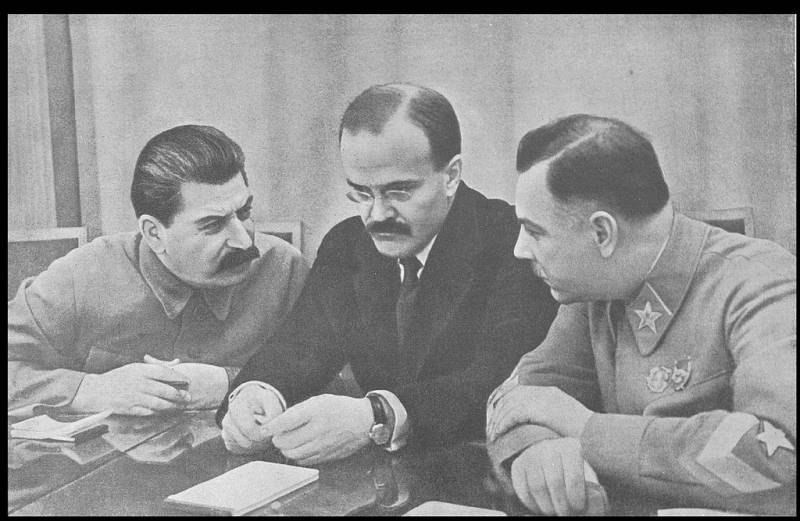
Information